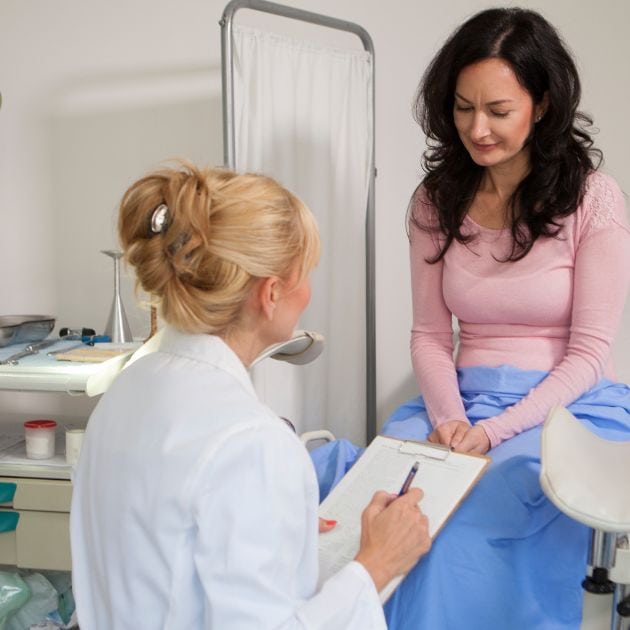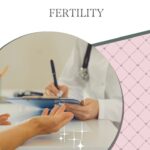Tick, tick, tick–the loudness of our biological clocks can be suffocating, can’t it? Especially since many of us spend a decent part of our lives trying not to get pregnant.
It’s not necessarily a matter of not wanting children one day. It’s about waiting for the right moment instead of letting our reproductive viability control our child-bearing narrative.
We’re too busy, too poor, too indecisive, too single, and so much more. Sadly, our wants and biological imperative don’t always go hand-in-hand.
This is obvious when we consider how the average age of first-time moms is rising in many socioeconomic groups.
After we’ve finished school, started our careers, found the ideal partner, and finally, decided we were ready, what happens when perimenopause and fertility issues put up a roadblock?
Most of us have heard our “elders” wax poetic about the insufferability of menopause, but not all of us even know that perimenopause is a “thing.”
I know I didn’t for the longest time.
I assumed that as long as I was having a period, my fertility remained intact and the metaphorical countdown clock on my reproductive organs still contained plenty of moments for the future.
While getting pregnant during perimenopause is an option, it helps to educate yourself on what’s happening during this timeframe.
If you’re over 40 and want to have a baby, let me say this straightaway–there ARE opportunities to start the family of your dreams. With a little time, effort, and maybe some science, there’s a great chance you can still become a parent.
Stick around if you’ve reached your late 30s or early 40s and feel concerned about your perimenopausal reproductive health. The information below will help you determine whether you need to worry about your pregnancy options now, in the future, or both.

This site contains affiliate links, meaning that we earn a small commission for purchases made through our site. We only recommend products we personally use, love, or have thoroughly vetted.
- What is Perimenopause? What are Its Effects?
- What Can You Expect from Perimenopause?
- Can You Get Pregnant During Perimenopause?
- Do Perimenopause and Fertility Treatments Automatically Go Together?
- Are There Higher Pregnancy Risks After Perimenopause?
- What Does Prenatal Care Look Like During Perimenopause?
- Can You “Stop” or “Reverse” Perimenopause?
- Tips for Trying to Conceive During Perimenopause
- Perimenopause Pregnancy Success Stories Do Exist
What is Perimenopause? What are Its Effects?
Let’s start with the basics: are perimenopause and menopause the same thing?
The answer is…kind of, but not really.
Think of it like this; if menopause is the final destination, perimenopause, which means “around menopause,” is the road you take to get there.
When I was younger, I thought reproduction was like a light switch. One day, it would just “turn off” and that would be the end of my periods and the start of menopause.
I was wrong.
The perimenopausal period is when changes begin in the body before full-fledged menopause occurs. Often, this transition starts around 40 years old and lasts approximately six years until our bodies complete the “change.”
Karen Shopoff Rooff, a health coach with expertise in postpartum and perimenopausal topics, mentions that this transition can happen much earlier or later than our 40th birthdays, though.
Rooff states: “The most noticeable changes that mark perimenopause are a shift in the menstrual cycle–either longer or shorter or heavier or lighter.”
Some other symptoms of perimenopause include:
- Anxiety
- Mood Swings
- Weight Gain
- Sleep Disturbances and Insomnia
- Headaches
- Vaginal Dryness
- Night Sweats
- Trouble Concentrating
- And more
Per Rooff, it’s worth noting that up to 20% of us won’t experience any symptoms at all but could still be in perimenopause around this age.
What Can You Expect from Perimenopause?
Are you wondering what’s most affected by the transition into your perimenopausal period? While this experience looks and feels different for all of us, some of the most common results include:
1. Menstrual Cycle
We’ve already mentioned that irregular periods may be the first indicator of your body’s reproductive changes. While you might imagine that means shorter, lighter periods that come few and far between, that’s only sometimes the case.
Some of us will have menstrual cycles that last longer than normal. Your flow could also become heavier than usual.
They might pop up irregularly, also. When a family member of mine was going through perimenopause, she noticed she wouldn’t get her period for a few months; then, she’d have two within 4-6 weeks. Perimenopause is different for all of us.
You might also notice changes to your PMS symptoms. This could mean different side effects or an increase or decrease in them.
2. Hormone Levels
As your body transitions into perimenopause, your estrogen levels (the most prominent female sex hormone) will undergo inconsistent rises and falls. Because of this, your progesterone levels may become imbalanced, too.
With these changes to your hormone levels, your ovaries may be unable to release eggs.
Some will also experience fluctuations in our follicle-stimulating hormones (FSH) during perimenopause. When our FSH levels are off, it can lead to further hormonal imbalances.
3. Eggs
As stated above, during perimenopause, there’s a chance your body might slowly stop releasing eggs, because of hormonal shifts and unpredictable ovulation.
Our eggs can also experience other changes during this period, too.
As we age, especially as we reach perimenopause, the quality and quantity of our eggs begins to diminish. So, while you might still release an egg during ovulation, there’s a chance the quality of it won’t be great.
Please keep in mind, though, all it takes is one good egg to get pregnant! Just because quality begins to decline doesn’t mean you’re out of viable eggs for conception.

Can You Get Pregnant During Perimenopause?
Let me say it louder for the people in the back: No matter how often you hear someone say things like “you’re wasting your reproductive years by waiting,” keep telling them to SHUT UP! You can still conceive as you age.
Consider all of the perimenopause pregnancy success stories that flood our news headlines every day. Each week, it seems like there are more and more articles about “older” celebrities conceiving for the first time, such as Hillary Swank, Da Brat, and Tamron Hall.
As we learn more about how perimenopause affects fertility, and we experience advances in assisted reproductive technology (ART), it’s increasingly likely we can start families into our older years.
Sometimes, it doesn’t even take much effort!
During our interview with Rooff, she mentioned that “…some women find themselves unexpectedly pregnant because their cycle length– and thus ovulation timing– has changed.”
While there’s no denying that getting pregnant during perimenopause can be challenging, that doesn’t mean it’s impossible.
Why Does Perimenopause Affect Pregnancy?
So, what is it about perimenopause that can take a toll on our fertility?
As a certified expert in pregnancy health, along with an education in perimenopausal wellness, Rooff says this about the connection between the two:
“Because perimenopause is the natural decline of female sex hormones, having less estrogen and progesterone creates a less-than-ideal situation for pregnancy. Estrogen is the hormone that regulates the menstrual cycle, and progesterone is responsible for supporting a healthy pregnancy by creating a healthy endometrial lining.”
“They don’t decline at the same rate, however, so you can have relatively high estrogen– which creates a seemingly normal menstrual cycle–but relatively low progesterone, in which case you could get pregnant but would have a hard time sustaining the pregnancy.”
Per statistics provided by the American Society of Reproductive Medicine (ASRM), most of us have a 5% chance during each monthly cycle of getting pregnant after 40.
Again, though, just because the chances of pregnancy during perimenopause are slim, starting or expanding your family IS still possible.
Do Perimenopause and Fertility Treatments Automatically Go Together?
It’s clear that getting pregnant during perimenopause is POSSIBLE, but will it automatically require some type of female infertility treatment or assisted reproductive technology?
Not always!
While the chances of getting pregnant naturally can be unpredictable, there’s no hard and fast rule stating you’ll definitely need to see a fertility doctor to conceive.
If you do, they might suggest treatment options, such as fertility medications, intrauterine insemination (IUI), or in vitro fertilization (IVF).
Will You Need Donor Eggs to Conceive During Perimenopausal Changes?
A common issue regarding advanced age and fertility is the rapid decline in egg quality and quantity. Because of this, you might think getting pregnant with your eggs is out of the question.
Not so much, though.
While using donor eggs is an option for anyone needing fertility assistance, it’s not a requirement.
As stated earlier, plenty of us still have enough healthy eggs to conceive without egg donation. If your doctor feels like your ovarian reserves or egg health is a problem, finding a donor is a reliable alternative.
Are There Higher Pregnancy Risks After Perimenopause?
A friend of mine just found out that she’s pregnant at 37. We were joking around that about how her “advanced maternal age” makes her a high-risk patient.
She is one of the most active and healthy people I know, so it’s strange to think her age alone makes her a “risk,” but alas, that’s the way it goes.
There’s a possibility of issues in any pregnancy, but since “advanced maternal age” is in itself a risk factor, maintaining a healthy, viable pregnancy during perimenopause can come with possible problems.
One of the most significant concerns is the risk of miscarriage. There is a 40% chance of pregnancy loss in people between the ages of 40 and 44 and an 85% chance of miscarriage after 45.
Some other potential issues include:
- Chromosomal Abnormalities
- Gestational Diabetes
- Premature Birth
- Stillbirth
- Placenta Previa
- Gestational Hypertension
Try not to let these things scare you, though. After all, every pregnancy comes with risks.
While there’s a chance of developing one or more of these problems, they are not a guarantee. To help prevent and/or detect any potential issues with your pregnancy, you should speak with your ob/gyn to learn more about any prenatal care requirements for high-risk pregnancies.
What Does Prenatal Care Look Like During Perimenopause?
Whether you’re trying to conceive during perimenopause or you’re already pregnant, it’s helpful to understand the type of healthcare procedures you might require. Below are the tests and screenings your doctor will likely suggest as you consider your fertility options during perimenopause.
1. General Fertility Testing
As you start your family-building journey, your doctor might suggest basic fertility screenings. These will give baseline information about your overall reproductive health that they will then use to help you find a treatment protocol for conception, if needed.
These fertility screenings are generally pretty simple and include tests such as bloodwork, transvaginal ultrasounds, and pelvic exams.
2. Genetic Screening
Once you become pregnant, your doctor might recommend a genetic screening test. While these are suggested for most pregnancies, they’re especially important for high-risk mamas since chromosomal defects are more common in babies as we get older.
3. Earlier Testing During Pregnancy
Occasionally, your doctor might suggest running certain tests earlier than normal if you’re an older parent or have already started perimenopause. This is especially common with the glucose test since gestational diabetes is more common at an “advanced maternal age.”
4. More Frequent Appointments
In general, prenatal care isn’t too different for perimenopausal individuals. Depending on your individual risk factors and test results, though, it’s possible your doctor might request more frequent pregnancy appointments.
Can You “Stop” or “Reverse” Perimenopause?
Wouldn’t it be nice if there was a magic button we could press to postpone the perimenopausal stage of our life?
Unfortunately, “stopping” reproductive changes for fertility is not possible, because, according to Rooff,
“Perimenopause is a natural part of life. While there is hormone therapy to help even out the ebbs and flows of the hormonal changes of midlife, there is no way to reverse or stop it.”
Try not to stress too much about entering perimenopause when you want to have a baby, though. Having a plan and working with your ob/gyn or reproductive endocrinologist can help you feel a lot more secure and settled as you start trying to have a baby.

Tips for Trying to Conceive During Perimenopause
If you’re approaching perimenopause but still want to have a baby, all hope is certainly not lost. To improve your chances of getting pregnant naturally, try the suggestions below.
1. Look for Signs of Ovulation During Perimenopause
While tracking ovulation during your perimenopausal period can be difficult because of irregular periods, there are signs you can look for. These include monitoring your cervical mucus and taking your basal body temperature.
2. Talk to Your Doctor
If you’re hoping to conceive during perimenopause, one of the best things you can do is talk to your ob/gyn. They can guide you on the best next steps and help you get any fertility testing you may require.
While most of us will need to see a reproductive endocrinologist (RE), a doctor who specializes in fertility if we’re over 40 and having trouble conceiving, it doesn’t hurt to start with your ob/gyn. They can jumpstart any screening and provide valuable references to trusted REs in your area.
Normally, seeking healthcare advice for conception troubles is not suggested until you’ve tried to get pregnant for at least 12 months. However, if you’re over 35, most doctors prefer you make an appointment after six.
3. Manage Your Stress Levels
Studies prove a connection between stress and infertility. Since perimenopause can make trying to conceive (TTC) tough, practicing self-care and stress management is essential.
4. Maintain a Healthy Lifestyle
From decreasing your alcohol intake to eating a well-rounded, healthy diet, making positive lifestyle and dietary changes when you want to get pregnant during perimenopause is helpful.
In an article from UNC Healthtalk, Dr. Rachel Urrutia, an ob/gyn, says:
“All the things that will help promote a healthy pregnancy still apply, especially during perimenopause. This means a woman should stick to eating a healthy diet, exercising, getting good sleep, minimizing stress and not using substances.”
Some changes you can implement are gentle exercise routines, healthy sleep habits, stopping smoking, eating foods that are good for fertility, and decreasing your caffeine and alcohol intake.
Perimenopause Pregnancy Success Stories Do Exist
In a perfect world, we shouldn’t be rushed to grow a family. We deserve the option to take our time and make that choice when we’re ready.
Thinking that biology might be working against us can make the wait and eventual decision to start terrifying. Especially since many of us don’t have the financial ability to freeze our eggs until we’re ready.
Try your best to remain positive, though. While it’s natural to worry, there are many opportunities to grow a family later in life.
In fact, the number of older people getting pregnant has continually risen since the 80s. During 2017, for instance, an astounding 114,730 babies were born to people between the ages of 40 and 44. Mamas over 45 gave birth to more than 9,000!
Just because you’ve entered the perimenopausal stage of your life doesn’t mean your dreams of getting pregnant are squashed. While conceiving can be tricky as you age, it’s definitely still an option.
Have you been worried about the effects of perimenopause and fertility? What first steps have you taken?
Note: A special thank you to Karen Shopoff Rooff for her guidance on this article. If you would like to learn more about the perimenopausal phase of your life, please check out her website Balance Personal Fitness Training.










